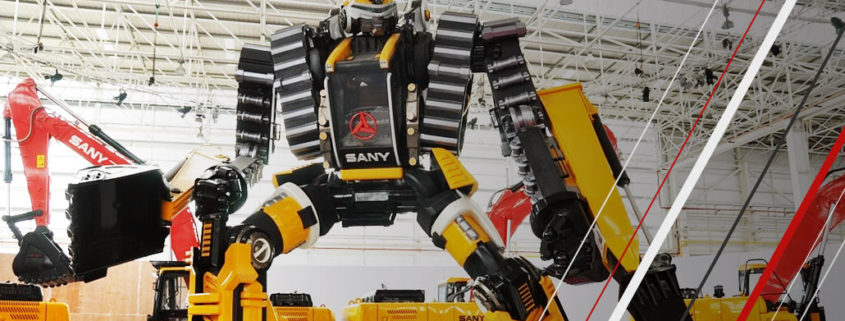A human free construction site?
In a recently published paper entitled Innovation 2050 – A digital Future for the Infrastructure Industry – Balfour Beatty have predicted that the construction site of 2050 will be human-free.
Robots will work in teams to build complex structures using dynamic new materials. Elements of the build will self-assemble. Drones flying overhead will scan the site constantly, inspecting the work and using the data collected to predict and solve problems before they arise, sending instructions to robotic cranes and diggers and automated builders with no need for human involvement. The role of the human overseer will be to remotely manage multiple projects simultaneously, accessing 3D and 4D visuals and data from the on-site machines, ensuring the build is proceeding to specification. The very few people accessing the site itself will wear robotically enhanced exoskeletons and will use neural-control technology to move and control machinery and other robots on site.
They also noted 10 predictions for 2050:
1. The industry will become increasingly focused on innovation and both contractors and customers will become less risk-averse.
2. The shape and offer of the infrastructure industry will change significantly, with new business models, products and services.
3. Infrastructure will move on from concrete and steel to include new materials which respond to their surroundings.
4. New jobs and industries will be created – and some will disappear, especially low or zero skill roles and those relying on repetition of tasks.
5. Thinking only about design and construction will become an outdated concept as infrastructure becomes multi-functional.
6. Robots will become more prevalent in construction.
7. Construction will get faster, using 3D and 4D printing, and self-transforming objects which self-assemble.
8. New, disruptive ideas will emerge, for making mass transit faster, safer and less damaging to the environment.
9. We will increasingly use wearable technology such as exoskeletons.
10. Direct neural control over devices and vehicles will be accessible to the industry.
They continue by stating that the infrastructure and construction industry is at a crossroads. It faces a number of existing and emerging challenges. By contrast with other industries, which have successfully harnessed technological advances to improve and reshape their products and services, the infrastructure sector has not yet embraced the full potential of the latest techniques and tools. Indeed, it remains surprisingly low-tech, with relatively low levels of automation. Meanwhile, productivity in the global infrastructure sector is among the worst of any industry, having remained static at 1% for the past 20 years. Profit margins are often wafer thin, and the industry is facing a critical skills shortage in many countries, due in part to its ‘old-fashioned’ image.
They conclude that no one knows for certain where the Digital Revolution will take us, but it holds massive potential to transform both the industry and the built environment. The infrastructure and construction industry has not yet seen the same rate of transformation as some other industries, but that is beginning to change – and the change will be both significant and unstoppable. “Big data” will facilitate more evidence-based decisions and a better understanding of the customer, while technologies currently in their infancy will mature and new technologies will enable us to deliver faster, better and safer. The rapid pace of digital change is only set to increase. It will redefine infrastructure and construction and the industry will need to anticipate that change and adapt quickly, becoming more innovative and less risk-averse, in response. We must be ready to embrace new technologies, new business models, and new possibilities and ideas as they emerge. But we must be prepared to balance the benefits with the risks.
They also believe that the infrastructure industry must modernise in order to secure its own future. Those companies at the forefront of the digital revolution, which integrate new technologies most effectively, updating their business capabilities and their offer, will reap the biggest rewards.
A copy of the full report can be seen here
Its well worth a read!





